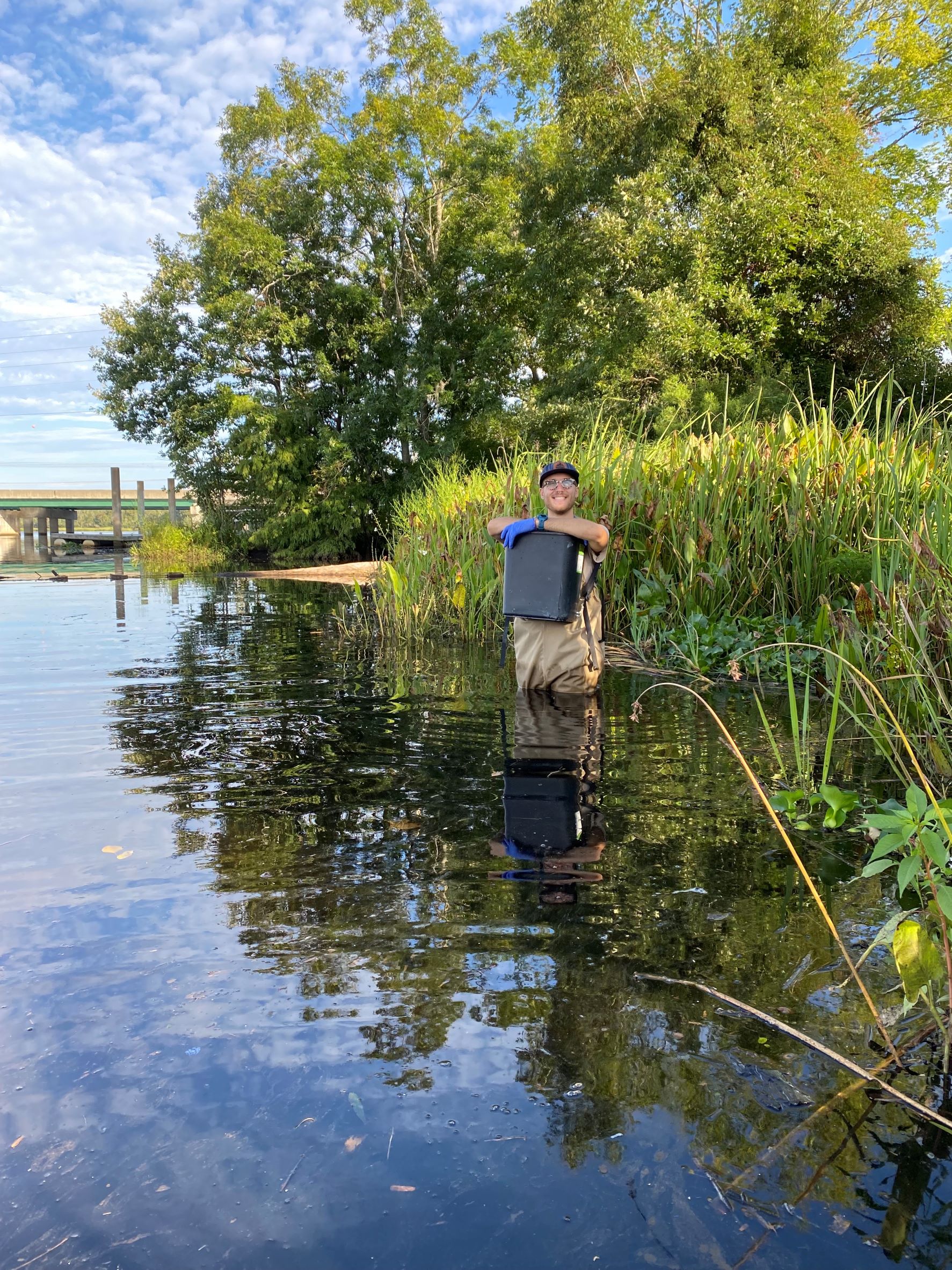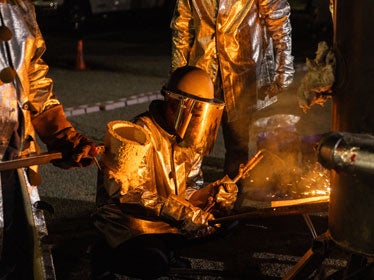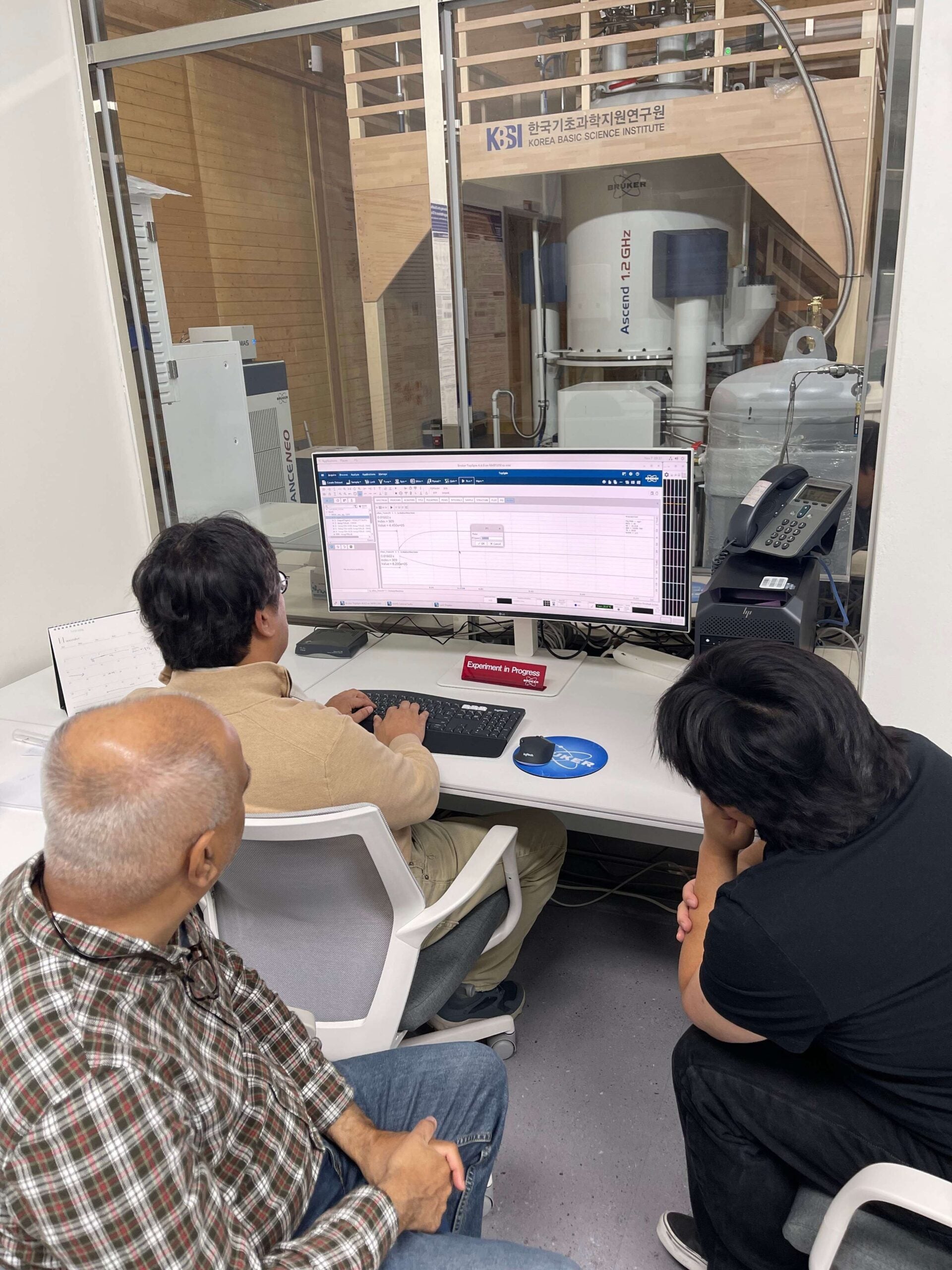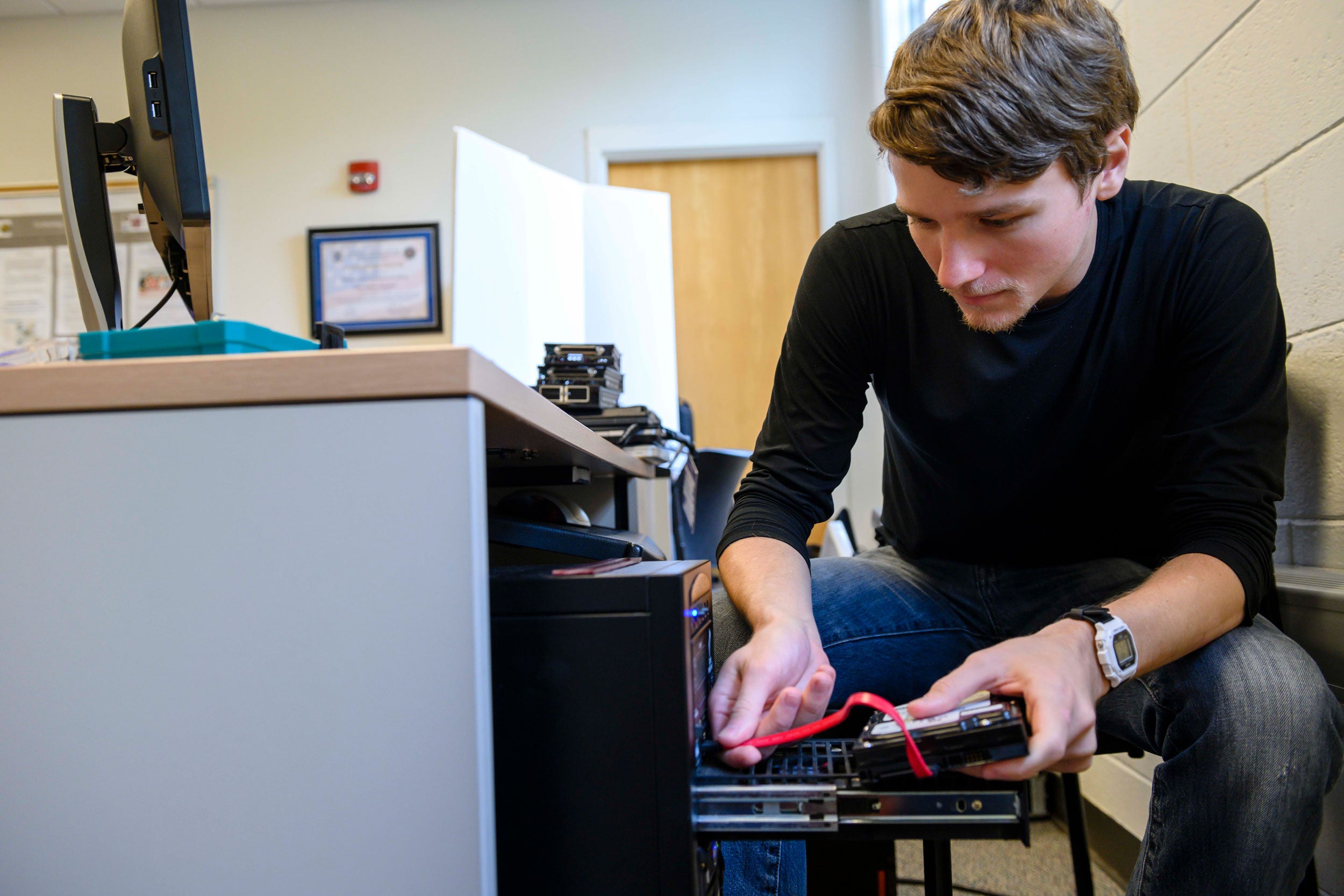James H. Oliver, Jr. Institute for Coastal Plain Science
At the James H. Oliver, Jr. Institute for Coastal Plain Science (ICPS), we explore the unique ecosystems of Georgia’s Coastal Plain, a vast and diverse region covering southern and southeastern Georgia. This living laboratory—home to marshes, swamps, and coastal habitats—provides an unparalleled environment for scientific discovery and sustainable resource management.
James H. Oliver, Jr. Institute for Coastal Plain Science
Center for Advanced Materials Science
The Georgia Southern Center for Advanced Materials Science (GS-CAMS) is dedicated to enriching the educational journey for undergraduate and graduate students in the field of materials science. With a focus on pioneering research in both fundamental and applied materials, GS-CAMS strives for national acclaim. Moreover, the center is committed to fostering economic growth and development, not just in southeast Georgia, but extending its impact beyond the region. Explore how GS-CAMS is shaping the future of materials science and contributing to broader socio-economic advancements.
Center for Advanced Materials Science
The Cancer Research Group
The Cancer Research Group focuses on their strengths in Medicinal Chemistry, Epidemiology/Behavior/Prevention, Computational Sciences and Cancer Diagnostics to perform high-quality, interdisciplinary research in key areas of cancer prevention, detection, and treatment.
Faculty from five departments and three colleges participate in interdisciplinary cancer research at Georgia Southern University.

The mission of the Cancer Research Interdisciplinary Group is to focus on our strengths in Medicinal Chemistry, Epidemiology/Behavior/Prevention, Computational Sciences and Cancer Diagnostics, performing high-quality, interdisciplinary research in key areas of cancer prevention, detection, and treatment.
Our Vision is to establish an interactive network of cancer research in the southeast that significantly contributes to the advancement of cancer prevention and care.
Curtis & Elizabeth Anderson Cancer Institute, Memorial University Medical Center, Savannah
Medicinal Chemistry
| Name | College & Department |
|---|---|
| Evans Afriyie-Gyawu, PhD | JPHCOPH, Environmental Health Sciences |
| Karelle Aiken, PhD | COSM, Chemistry |
| John DiCesare, PhD | COSM, Department Chair for Chemistry |
| Eric Gato, PhD | COSM, Chemistry |
| Li Ma, PhD | COSM, Physics |
| Michele McGibony, PhD | COSM, Chemistry |
| Marshall Ming, PhD | COSM, Chemistry |
| Rafael Quirino, PhD | COSM, Chemistry |
| Hans Schanz, PhD | COSM, Chemistry |
| M. Abid Shaikh, PhD | COSM, Chemistry & Cancer Research Team Leader |
| Vinoth Sittaramane, PhD | COSM, Biology |
| Amanda Stewart, PhD | COSM, Chemistry |
| John Stone, PhD | COSM, Chemistry |
| Yelena Tarasenko, PhD | JPHCOPH, Health Policy and Management, & Epidemiology |
| Christine Whitlock, PhD | COSM, Chemistry |
| Yan Wu, PhD | COSM, Mathematical Sciences |
Computational
| Name | College & Department |
|---|---|
| Alex Stokolos, PhD | COSM, Mathematical Sciences |
| Hua Wang, PhD | COSM, Mathematical Sciences |
| Yan Wu, PhD | COSM, Mathematical Sciences |
| Shijun Zheng, PhD | COSM, Mathematical Sciences |
Diagnostics
| Name | College & Department |
|---|---|
| Mohammed Ahad, PhD | CEIT, Electrical Engineering & Team Leader Diagnostics Research Group |
| Rocio Alba-Flores, PhD | CEIT, Electrical Engineering |
| Cheng Zhang, PhD | CEIT, Mechanical Engineering |
| Jiehua Zhu, PhD | COSM, Mathematical Sciences |
For more information about the Cancer Research Group, within the College of Science and Mathematics at Georgia Southern University, please contact:
M. Abid Shaikh, PhD
Team Leader, Cancer Research
Georgia Southern University
P.O. Box 8064
Statesboro, GA 30460
Phone: (912) 478-0973
Fax: (912) 478-0699
Email: malnu@georgiasouthern.edu
Computational Science
Finding Solutions for Real-Life Applications.
Computational Sciences, also known as Scientific Computing, involves using algorithms to solve physical, biological, social sciences and engineering problems through mathematical and statistical models. It complements the areas of theory and experimentation in traditional scientific investigation.
The Computational Sciences Group combines the complimentary experience and expertise of biologists, chemists, engineers, mathematicians, and physicists to build, analyze, and solve mathematical models for large scale complex problems from real applications.

The mission of the Computational Sciences Group includes:
- Develop advanced research, training, and outreach in computational science by stimulating interactions among researchers and practitioners from interdisciplinary fields and industry.
- To share expertise and computational tools with investigators and students interested in computational science.
- To provide information and support for securing extramural grants from various funding agencies and industry.
| Name | College & Department |
|---|---|
| Alex Stokolos, PhD | COSM, Mathematical Science |
| Yan Wu, PhD | COSM, Mathematical Science |
| Cheng Zhang, PhD | CEIT, Mechanical Engineering |
Image Processing
| Name | College & Department |
|---|---|
| Sungkuyun Lim, PhD | CEIT, Electrical Engineering |
| Hua Wang, PhD | COSM, Mathematical Sciences |
| Xiao-jun Wang, PhD | COSM, Physics |
| Yan Wu, PhD | COSM, Mathematical Sciences |
| Shaowen Xu, PhD | CEIT, Mechanical Engineering |
| Shijun Zheng, PhD | COSM, Mathematical Sciences |
| Jiehua Zhu, PhD | COSM, Mathematical Sciences |
Optimization
| Name | College & Department |
|---|---|
| Goran Lesaja, PhD | COSM, Mathematical Sciences |
| Sungkuyun Lim, PhD | CEIT, Electrical Engineering |
| Li Ma, PhD | COSM, Physics |
| Yan Wu, PhD | COSM, Mathematical Sciences |
Computing
| Name | College & Department |
|---|---|
| Rocio Alba-Flores, PhD | CEC, Electrical Engineering |
| Allison Amonette, PhD | COSM, Chemistry |
| Mark Edwards, PhD | COSM, Physics |
| Ryan Fortenberry, PhD | COSM, Chemistry |
| Clayton Heller, PhD | COSM, Department Chair for Physics |
| Scott Kersey, PhD | COSM, Mathematical Sciences |
| Shahnam Navaee, PhD | CEC, Civil Engineering |
| Reinhard Piltner, PhD | COSM, Mathematical Sciences |
| Mosfequr Rahman, PhD | CEC, Mechanical Engineering |
| Biswanath Samanta, PhD | CEC, Mechanical Engineering |
| Hani Samawi, PhD | JPHCOPH, Director, K.E. Peace Center for Biostatistics |
| Alex Stokolos, PhD | COSM, Mathematical Sciences |
| Shijun Zheng, PhD | COSM, Mathematical Sciences |
PDE
| Name | College & Department |
|---|---|
| Mark Edwards, PhD | COSM, Physics |
| Sze-Man Ngai, PhD | COSM, Mathematical Sciences |
| Alex Stokolos, PhD | COSM, Mathematical Sciences |
| Shijun Zheng, PhD | COSM, Mathematical Sciences |
SDL
| Name | College & Department |
|---|---|
| Emil Iacob, PhD | COSM, Mathematical Sciences |
| Goran Lesaja, PhD | COSM, Mathematical Sciences |
| Hani Samawi, PhD | JPHCOPH, Director, K.E. Peace Center for Biostatistics |
| Alex Stokolos, PhD | COSM, Mathematical Sciences |
Date, Time & Location: Friday, June 3rd at 11 am in MP 1303
Speaker: Dr. Guang Peng, University of Texas MD Anderson Cancer Center
Title: Systems biology approaches to understand and target the DNA repair network
Abstract:
Current studies of DNA repair processes are focused on dissecting the function of single genes. This classic molecular biology approach provides a wealth of knowledge about individual components and their functions in DNA repair; however, this approach is not able to integrate all information about properties of individual DNA repair genes or proteins to elucidate their collective interplay. To overcome this challenge, we proposed to study DNA repair using systems biology approaches. Homologous recombination (HR)-mediated DNA repair is a fundamental biological process to prevent genomic instability by repairing DNA double strand breaks (DSBs). We have generated a HR defective (HRD) gene signature via genome-wide transcriptome profiling in HR-deficient cells. Our study showed that the HRD signature can be used to functionally assess HR repair status at a network level without interrogating specific genetic alterations in cells. HRD can also serve as an effective drug discovery platform to identify drugs targeting HR repair as potential chemosensitizers. More importantly, this HRD is able to predict clinical outcomes across multiple tumor lineages by functionally assessing HR repair status in patient tumor samples. Furthermore, using data in the Ingenuity databases, we constructed a graph with nodes representing genes and directed links representing biological interactions. We were able to analyze the HR repair network as a weighted directed graph, to which we used flow network and maximum flow to predict mechanisms and/or targets that can synthetically rescue the dysfunctional HR repair network in BRCA-deficient cells. It is our hope that the knowledge gained from our study may help develop new strategies for preventing BRCA-associated cancer in women to realize the promise of precision medicine in cancer prevention.
About the Speaker:
Dr. Guang Peng is an assistant professor in the Department of Clinical Cancer Prevention at The University of Texas MD Anderson Cancer Center. The long-term goal of her research is to characterize and target molecular regulators of the mutational and dysfunctional DNA repair processes driving tumorigenesis. One of her major interests is to develop systems biology approaches to understand the dynamics of the DNA repair network in tumor evolution. We aim to utilize network-based mathematical modeling and molecular biology approaches to understand and target the DNA repair network. These new interdisciplinary approaches will offer a revolutionary conceptual framework to determine the compound effect of the DNA repair network rather than focusing on an individual repair gene’s function in tumorigenesis. Her research has been funded by several agents including National Cancer Institute (NIH), Department of Defense, American Association for Cancer Research, Susan Komen Foundation and Cancer Prevention Research Institute of Texas(CPRIT) .
Past Seminars (Login Required)For more information about the Computational Research Group, within the College of Science and Mathematics at Georgia Southern University, please contact:
Andrew Sills, PhD
Team Leader, Computational Science Research
Georgia Southern University
P.O. Box 8093
Statesboro, GA 30460
Phone: (912) 478-5424
Fax: (912) 478-0654
Email: asills@georgiasouthern.edu
